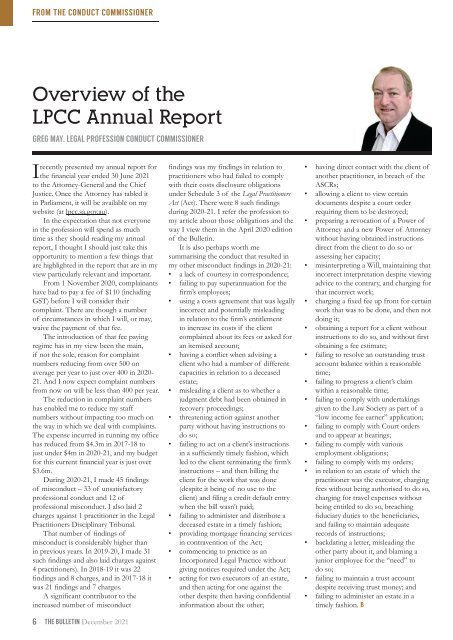LSB December 2021 HR
You also want an ePaper? Increase the reach of your titles
YUMPU automatically turns print PDFs into web optimized ePapers that Google loves.
FROM THE CONDUCT COMMISSIONER<br />
Overview of the<br />
LPCC Annual Report<br />
GREG MAY, LEGAL PROFESSION CONDUCT COMMISSIONER<br />
recently presented my annual report for<br />
I the financial year ended 30 June <strong>2021</strong><br />
to the Attorney-General and the Chief<br />
Justice. Once the Attorney has tabled it<br />
in Parliament, it will be available on my<br />
website (at lpcc.sa.gov.au).<br />
In the expectation that not everyone<br />
in the profession will spend as much<br />
time as they should reading my annual<br />
report, I thought I should just take this<br />
opportunity to mention a few things that<br />
are highlighted in the report that are in my<br />
view particularly relevant and important.<br />
From 1 November 2020, complainants<br />
have had to pay a fee of $110 (including<br />
GST) before I will consider their<br />
complaint. There are though a number<br />
of circumstances in which I will, or may,<br />
waive the payment of that fee.<br />
The introduction of that fee paying<br />
regime has in my view been the main,<br />
if not the sole, reason for complaint<br />
numbers reducing from over 500 on<br />
average per year to just over 400 in 2020-<br />
21. And I now expect complaint numbers<br />
from now on will be less than 400 per year.<br />
The reduction in complaint numbers<br />
has enabled me to reduce my staff<br />
numbers without impacting too much on<br />
the way in which we deal with complaints.<br />
The expense incurred in running my office<br />
has reduced from $4.3m in 2017-18 to<br />
just under $4m in 2020-21, and my budget<br />
for this current financial year is just over<br />
$3.6m.<br />
During 2020-21, I made 45 findings<br />
of misconduct – 33 of unsatisfactory<br />
professional conduct and 12 of<br />
professional misconduct. I also laid 2<br />
charges against 1 practitioner in the Legal<br />
Practitioners Disciplinary Tribunal.<br />
That number of findings of<br />
misconduct is considerably higher than<br />
in previous years. In 2019-20, I made 31<br />
such findings and also laid charges against<br />
4 practitioners). In 2018-19 it was 22<br />
findings and 8 charges, and in 2017-18 it<br />
was 21 findings and 7 charges.<br />
A significant contributor to the<br />
increased number of misconduct<br />
findings was my findings in relation to<br />
practitioners who had failed to comply<br />
with their costs disclosure obligations<br />
under Schedule 3 of the Legal Practitioners<br />
Act (Act). There were 8 such findings<br />
during 2020-21. I refer the profession to<br />
my article about those obligations and the<br />
way I view them in the April 2020 edition<br />
of the Bulletin.<br />
It is also perhaps worth me<br />
summarising the conduct that resulted in<br />
my other misconduct findings in 2020-21:<br />
• a lack of courtesy in correspondence;<br />
• failing to pay superannuation for the<br />
firm’s employees;<br />
• using a costs agreement that was legally<br />
incorrect and potentially misleading<br />
in relation to the firm’s entitlement<br />
to increase its costs if the client<br />
complained about its fees or asked for<br />
an itemised account;<br />
• having a conflict when advising a<br />
client who had a number of different<br />
capacities in relation to a deceased<br />
estate;<br />
• misleading a client as to whether a<br />
judgment debt had been obtained in<br />
recovery proceedings;<br />
• threatening action against another<br />
party without having instructions to<br />
do so;<br />
• failing to act on a client’s instructions<br />
in a sufficiently timely fashion, which<br />
led to the client terminating the firm’s<br />
instructions – and then billing the<br />
client for the work that was done<br />
(despite it being of no use to the<br />
client) and filing a credit default entry<br />
when the bill wasn’t paid;<br />
• failing to administer and distribute a<br />
deceased estate in a timely fashion;<br />
• providing mortgage financing services<br />
in contravention of the Act;<br />
• commencing to practice as an<br />
Incorporated Legal Practice without<br />
giving notices required under the Act;<br />
• acting for two executors of an estate,<br />
and then acting for one against the<br />
other despite then having confidential<br />
information about the other;<br />
• having direct contact with the client of<br />
another practitioner, in breach of the<br />
ASCRs;<br />
• allowing a client to view certain<br />
documents despite a court order<br />
requiring them to be destroyed;<br />
• preparing a revocation of a Power of<br />
Attorney and a new Power of Attorney<br />
without having obtained instructions<br />
direct from the client to do so or<br />
assessing her capacity;<br />
• misinterpreting a Will, maintaining that<br />
incorrect interpretation despite viewing<br />
advice to the contrary, and charging for<br />
that incorrect work;<br />
• charging a fixed fee up front for certain<br />
work that was to be done, and then not<br />
doing it;<br />
• obtaining a report for a client without<br />
instructions to do so, and without first<br />
obtaining a fee estimate;<br />
• failing to resolve an outstanding trust<br />
account balance within a reasonable<br />
time;<br />
• failing to progress a client’s claim<br />
within a reasonable time;<br />
• failing to comply with undertakings<br />
given to the Law Society as part of a<br />
“low income fee earner” application;<br />
• failing to comply with Court orders<br />
and to appear at hearings;<br />
• failing to comply with various<br />
employment obligations;<br />
• failing to comply with my orders;<br />
• in relation to an estate of which the<br />
practitioner was the executor, charging<br />
fees without being authorised to do so,<br />
charging for travel expenses without<br />
being entitled to do so, breaching<br />
fiduciary duties to the beneficiaries,<br />
and failing to maintain adequate<br />
records of instructions;<br />
• backdating a letter, misleading the<br />
other party about it, and blaming a<br />
junior employee for the “need” to<br />
do so;<br />
• failing to maintain a trust account<br />
despite receiving trust money; and<br />
• failing to administer an estate in a<br />
timely fashion. B<br />
6<br />
THE BULLETIN <strong>December</strong> <strong>2021</strong>


















